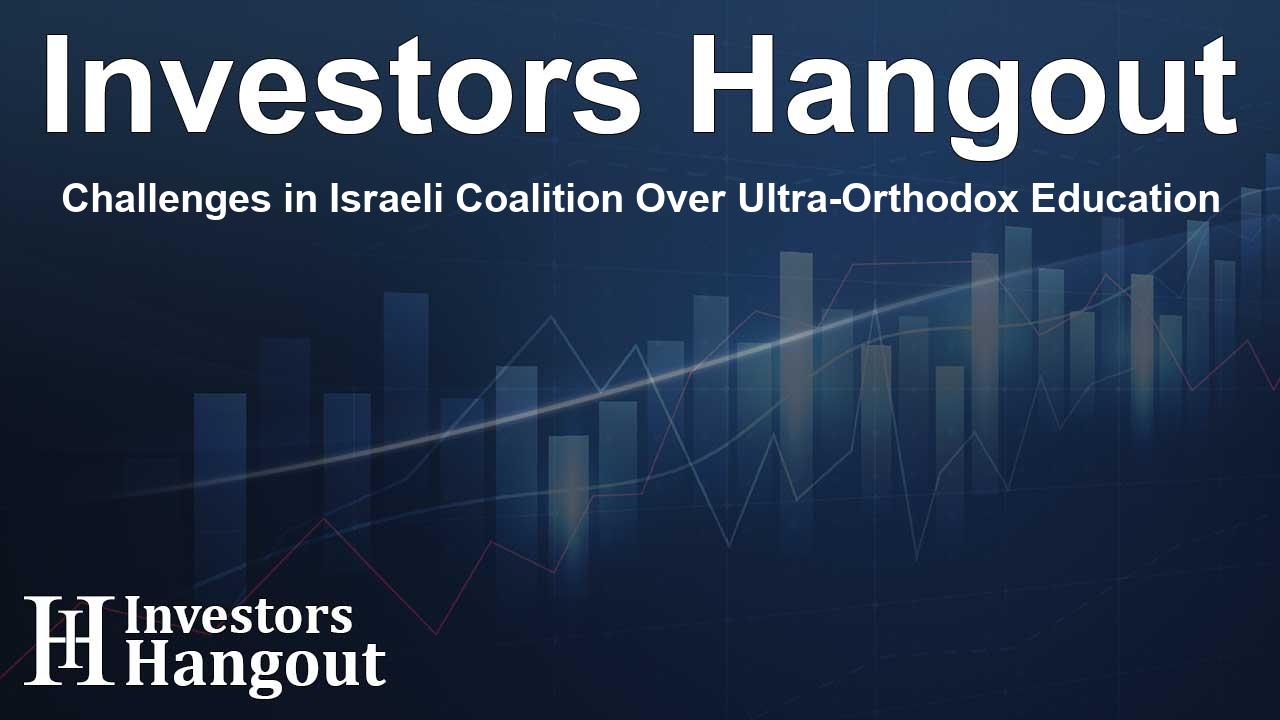Challenges in Israeli Coalition Over Ultra-Orthodox Education

Growing Tensions in Israel's Coalition Government
Israel's political landscape is once again facing significant challenges, particularly within the coalition government led by Prime Minister Benjamin Netanyahu. As the ultra-Orthodox parties push forward with their demands, the unity of the government is being tested, stirring concerns amongst the coalition's stability.
Ultra-Orthodox Education Funding Dispute
At the heart of the latest rift lies the ultra-Orthodox demand for their educational institutions to receive similar funding and benefits that state-run schools encounter. This includes financial support for the 'New Horizon' program, which enhances teaching hours and increases teacher salaries significantly.
The Voices of Education Leaders
The call for educational equity has been emphasized by ultra-Orthodox Education Minister Haim Biton from the Shas party. He expressed frustration over the lack of support for teachers within the ultra-Orthodox system, stating, "For a year we have been fighting for the entry of 'New Horizon' into ultra-Orthodox institutions. There is no reason for our teachers to be discriminated against." His commitment to remaining in the coalition despite these tensions points to a complex political landscape.
Boycotts and Parliamentary Strategies
The other prominent ultra-Orthodox party, United Torah Judaism (UTJ), has signaled stronger dissent by notifying coalition officials of their intent to boycott parliamentary votes until the education funding issue is resolved. This kind of strategic maneuvering indicates a pivotal moment in the coalition's dynamics as the parties navigate through their internal conflicts.
Impact on National Security and Budgetary Concerns
Coalition whip Ophir Katz has been active in attempting to mitigate a potential conflict ahead of crucial votes on budgetary allocations, including a noteworthy boost of 3.4 billion shekels (approximately $918.35 million) aimed at assisting Israelis displaced by violence. The financial ramifications of the education funding dispute are considerable and could affect other pressing national security needs.
The Broader Context of Coalition Relations
The ongoing rifts among Netanyahu's coalition partners have been detrimental to governmental operations. For almost two years, the coalition has faced crises stemming from public protests against judicial reforms and military conflicts. With 64 of the 120 parliamentary seats held by the government, the fragility of their partnership poses significant risks, as seen through repeated challenges from far-right parties over handling military strategies.
Future Implications on Israeli Politics
As security concerns rise following the October 7 attacks by Hamas, there seems to be an urgency within the coalition to maintain unity, even with mounting grievances. Experts suggest that while a full-blown breakup of the coalition may not be imminent, the existing tensions may pave the way for deeper fractures in the future.
As the ultra-Orthodox communities voice their grievances, particularly in education funding, it reflects a broader struggle within Israeli society, where varying interests collide. Observers are keenly watching how these political dynamics will unfold and what future implications these funding disputes might hold for Netanyahu's government.
Frequently Asked Questions
What are the main education funding demands from ultra-Orthodox parties?
The ultra-Orthodox parties are seeking equal funding and benefits for their educational institutions that match those provided to state-run schools, particularly access to the 'New Horizon' program.
How has the coalition responded to the education funding issue?
One ultra-Orthodox party plans to boycott parliamentary votes until the funding issue is addressed, highlighting internal dissent within the coalition.
Why is the education budget so critical now?
The education budget's resolution is vital not only for the ultra-Orthodox community but also for the overall stability of the coalition amid security crises in the country.
What is the significance of the 'New Horizon' program?
The 'New Horizon' program is designed to improve educational opportunities by increasing school hours and teacher salaries, crucial for raising teaching standards.
What might be the future consequences of these tensions?
Analysts suggest that ongoing disputes over funding may trigger more profound issues within the coalition, potentially leading to future fractures.
About Investors Hangout
Investors Hangout is a leading online stock forum for financial discussion and learning, offering a wide range of free tools and resources. It draws in traders of all levels, who exchange market knowledge, investigate trading tactics, and keep an eye on industry developments in real time. Featuring financial articles, stock message boards, quotes, charts, company profiles, and live news updates. Through cooperative learning and a wealth of informational resources, it helps users from novices creating their first portfolios to experts honing their techniques. Join Investors Hangout today: https://investorshangout.com/
Disclaimer: The content of this article is solely for general informational purposes only; it does not represent legal, financial, or investment advice. Investors Hangout does not offer financial advice; the author is not a licensed financial advisor. Consult a qualified advisor before making any financial or investment decisions based on this article. The author's interpretation of publicly available data shapes the opinions presented here; as a result, they should not be taken as advice to purchase, sell, or hold any securities mentioned or any other investments. The author does not guarantee the accuracy, completeness, or timeliness of any material, providing it "as is." Information and market conditions may change; past performance is not indicative of future outcomes. If any of the material offered here is inaccurate, please contact us for corrections.